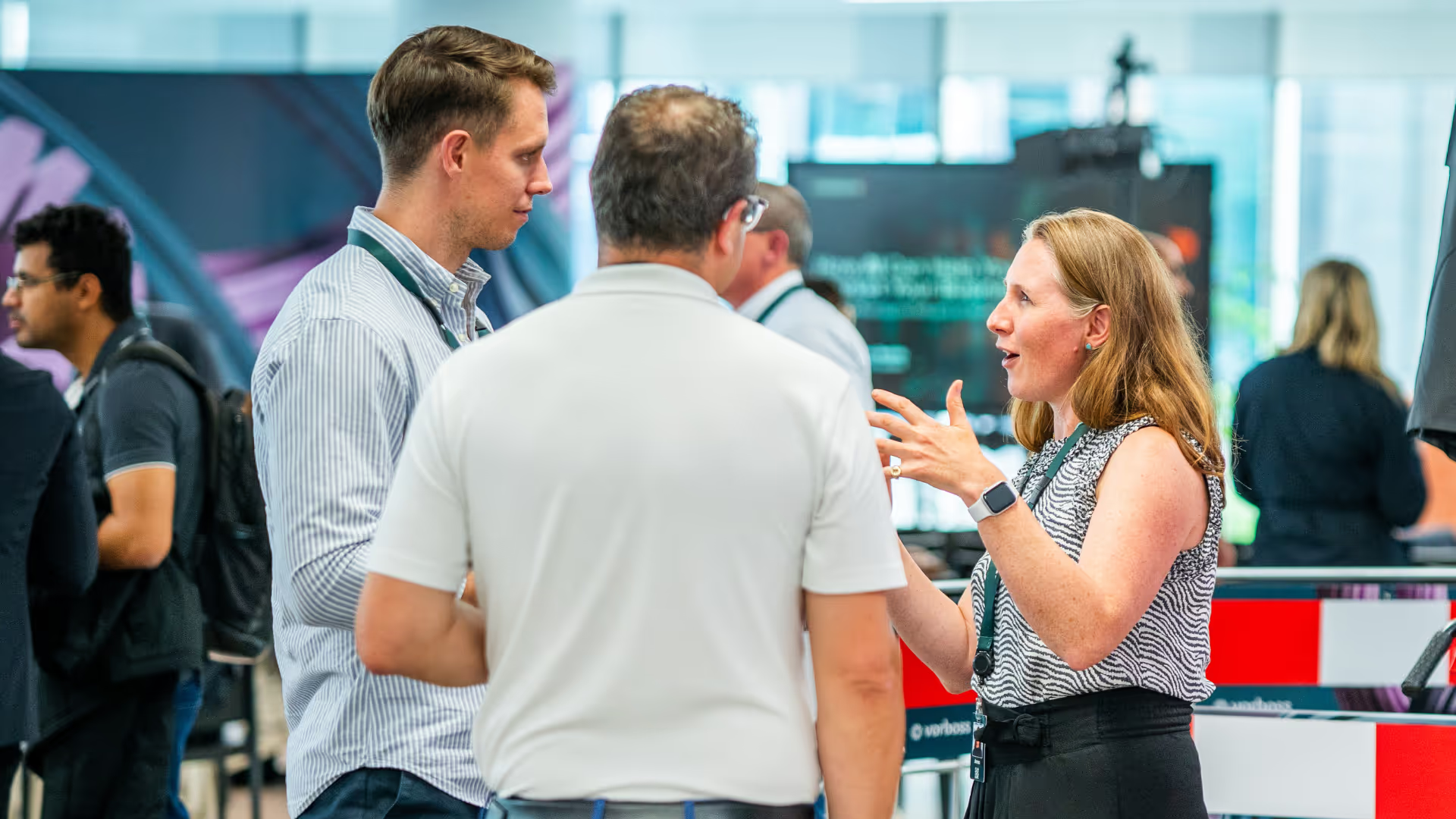.avif)
Highlights
This blog recaps Leading London, our live panel at London Tech Week, where industry leaders from tech, real estate, and investment explored what’s driving London’s momentum and where the opportunities lie. From tech-led growth and funding reforms to productivity challenges and the green transition, the panel shared candid views on what London is doing well, what needs to change, and how the city can stay ahead over the next decade.
London Tech Week – one of the most exciting events of the year for tech enthusiasts. It brings people from all over the world to our favourite city.
As a partner, we hosted a series of official fringe events at Vorboss HQ throughout the week – including a live panel discussion led by our Founder & CEO, Tim Creswick.
The panel featured industry leaders from tech, real estate, and investment:
- Russ Shaw CBE, Tech London Advocates & Global Tech Advocates
- Shaun Simons, Compton
- Jonathan Pollock, Elbow Beach Capital
Their conversation explored what’s driving London’s momentum, and where the biggest opportunities lie. From unlocking capital to the green transition, the panel shared where London is already winning, what’s starting to shift, and what needs to happen to turn potential into progress over the next decade.
What will drive growth in the next 10 years?
“Tech.” Russ said confidently. “The technology sector here is hugely diverse. We’re a world leader in AI. Climate-tech, edtech, fintech – they're all emerging,” he continued. Russ believes that the digitalisation of legacy industries will propel that growth.
Jonathan Pollock of Elbow Beach agrees there’s huge potential – but says much of it is still untapped. “London universities generate as much IP as those in the Bay Area”, he says, “and yet, there are way more unicorn founders coming out of the Bay Area universities.”
He believes that by promoting a stronger culture of entrepreneurship, providing better funding, and improving the digital and commercial infrastructure to support startups through to the scale-up stage, we can unlock this massive GDP growth and wealth creation opportunity.
“I get very excited about what's in the future.” - he added.
Russ, who’s spent over 30 years in London and travels regularly to tech hubs around the world, says the shift is already happening. And the numbers are there to back it up. In 2024, UK university-born businesses raised a record £2.6 billion in funding – up 38% year-on-year.

London – the most resilient city in the world?
Russ, founder of the globally recognised Tech Advocates, reminded us why London remains in the top 5 for global innovation. It’s not just about capital – it's the talent density, the research output, and a hard-earned resilience.
“British entrepreneurs are amongst some of the most resilient in the world.” - he said. “We’ve gone through a financial crash, Brexit, the pandemic – and those that are still standing are amongst some of the most resilient entrepreneurs in the world!”
The panel agreed that London already has huge advantages: world-class universities, a deep talent pool, vast research output, strong startup ecosystem and global reputation, but isn’t fully leveraging them to drive economic growth. To fully reap those benefits, we’ve got to unlock capital faster, fix broken incentives (yes, they’re still mad about Entrepreneur’s Relief), and start celebrating entrepreneurship louder.

How do we get UK’s productivity moving (again)?
UK productivity is higher than it was in 2008, but still well below where it should be if it had kept pace with pre-crisis growth.
The hybrid working debate has been a hot topic since the pandemic.
Shaun came in bold “remote work’s bad for business”. He argued that returning to the office is critical – for personal growth, for company culture, and most importantly, for business. “Going in and surrounding yourself with competitors drives productivity.”
Russ and JP believe that hybrid working still has a place, especially for bringing more people into the workforce. But everyone agreed that:
If we want London to stay competitive, we need to invest more in talent.
Funding: signs of progress
London still lacks access to funding – particularly at the scale-up stage. From JP’s observations, the UK lags behind the US by around 30% in available capital. But he assured us:
“The best companies still get funded.”
Especially those with strong tech foundations, demonstrable traction, and clear growth path.
There are positive signs of progress. Russ highlighted reforms underway at the London Stock Exchange, aimed at making it a more competitive and attractive environment for tech listings.
The government has also launched PISCES – the new private share trading platform to channel pension funds into high-growth UK companies.

The green agenda: burden or opportunity?
When it comes to green growth, the UK has the talent, the research, and the global credibility. The challenge is how we execute it.
In the commercial world, Shaun Simons of Compton shared his observation:
“For big business, sustainability is already on the agenda. Given the choice between a green building and a less sustainable one, they’ll choose green every time.”
But for smaller businesses, it’s not as simple. Many don’t have the time, budget, or resources to prioritise sustainability – and pushing those costs onto the consumer, Shaun warned, will only create frustration.
Jonathan Pollock believes the answer is technology.
He acknowledges that the issue isn’t around whether we’ll make the switch to net zero, but rather how that’s going to happen.
“Regulations like ULEZ are only adding pressure to businesses already under strain.”
But the tools are out there.
“There are commercially ready technologies that can decarbonise operations and deliver financial and commercial benefits at the same time,” he said.
So what’s stopping adoption? Risk appetite.
There are technologies that are commercially ready to use, that drive financial and commercial benefits for the customer, whilst decarbonising business operations at the same time. Changing procurement criteria, JP argued, is the way forward.

4 key takeaways from Leading London at London Tech Week
- Tech is London’s growth engine, and it’s just getting started
- New government initiative, PISCES designed specifically for startups to access secondary liquidity drives optimism
- Investing in new technology could be the answer to transitioning to net zero, benefitting both the customer and the business
- Entrepreneurship is increasingly celebrated in the UK, with university startups growing rapidly
About Leading London
London’s still the UK’s economic engine – and one of the most innovative cities on the planet. But what’s keeping it ahead? And what needs to change to make sure it stays there?
In this series, we bring together influential voices from across industries to discuss recent developments, the challenges that London faces, and explore what will drive growth over the next decade for the capital and beyond.
If you’d like to be part of the next discussion, get in touch via press@vorboss.com.
Tell us about yourself so we can serve you best.
More articles

Heading 1
Heading 2
Heading 3
Heading 4
Heading 5
Heading 6
Lorem ipsum dolor sit amet, consectetur adipiscing elit, sed do eiusmod tempor incididunt ut labore et dolore magna aliqua. Ut enim ad minim veniam, quis nostrud exercitation ullamco laboris nisi ut aliquip ex ea commodo consequat. Duis aute irure dolor in reprehenderit in voluptate velit esse cillum dolore eu fugiat nulla pariatur.
Block quote
Ordered list
- Item 1
- Item 2
- Item 3
Unordered list
- Item A
- Item B
- Item C
Bold text
Emphasis
Superscript
Subscript

Heading 1
Heading 2
Heading 3
Heading 4
Heading 5
Heading 6
Lorem ipsum dolor sit amet, consectetur adipiscing elit, sed do eiusmod tempor incididunt ut labore et dolore magna aliqua. Ut enim ad minim veniam, quis nostrud exercitation ullamco laboris nisi ut aliquip ex ea commodo consequat. Duis aute irure dolor in reprehenderit in voluptate velit esse cillum dolore eu fugiat nulla pariatur.
Block quote
Ordered list
- Item 1
- Item 2
- Item 3
Unordered list
- Item A
- Item B
- Item C
Bold text
Emphasis
Superscript
Subscript

.avif)

.avif)

